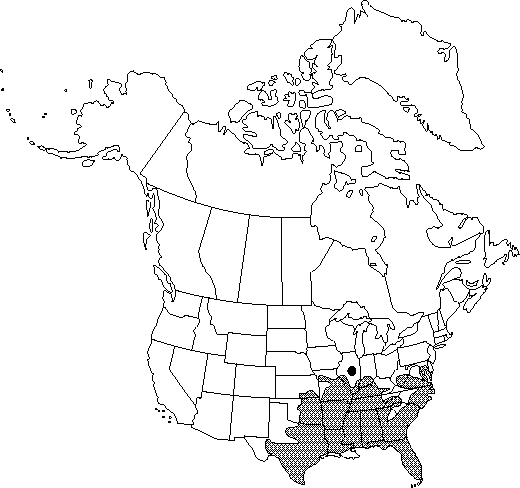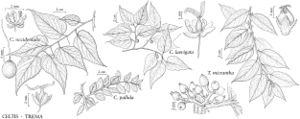Difference between revisions of "Celtis laevigata"
Enum. Pl. suppl: 67. 1814.
FNA>Volume Importer |
FNA>Volume Importer |
||
| Line 10: | Line 10: | ||
|special_status={{Treatment/ID/Special_status | |special_status={{Treatment/ID/Special_status | ||
|code=F | |code=F | ||
| − | |label= | + | |label=Illustrated |
}} | }} | ||
|basionyms= | |basionyms= | ||
| Line 16: | Line 16: | ||
|name=Celtis laevigata var. anomala | |name=Celtis laevigata var. anomala | ||
|authority=Sargent | |authority=Sargent | ||
| + | |rank=variety | ||
}} {{Treatment/ID/Synonym | }} {{Treatment/ID/Synonym | ||
|name=Celtis laevigata var. brachyphylla | |name=Celtis laevigata var. brachyphylla | ||
|authority=Sargent | |authority=Sargent | ||
| + | |rank=variety | ||
}} {{Treatment/ID/Synonym | }} {{Treatment/ID/Synonym | ||
|name=Celtis laevigata var. smallii | |name=Celtis laevigata var. smallii | ||
|authority=(Beadle) Sargent | |authority=(Beadle) Sargent | ||
| + | |rank=variety | ||
}} {{Treatment/ID/Synonym | }} {{Treatment/ID/Synonym | ||
|name=Celtis laevigata var. texana | |name=Celtis laevigata var. texana | ||
|authority=Sargent | |authority=Sargent | ||
| + | |rank=variety | ||
}} {{Treatment/ID/Synonym | }} {{Treatment/ID/Synonym | ||
|name=Celtis mississippiensis | |name=Celtis mississippiensis | ||
| − | |authority= | + | |authority= |
| + | |rank=species | ||
}} {{Treatment/ID/Synonym | }} {{Treatment/ID/Synonym | ||
|name=Celtis smallii | |name=Celtis smallii | ||
| − | |authority= | + | |authority= |
| + | |rank=species | ||
}} | }} | ||
|hierarchy=Ulmaceae;Celtis;Celtis laevigata | |hierarchy=Ulmaceae;Celtis;Celtis laevigata | ||
| Line 55: | Line 61: | ||
-->{{#Taxon: | -->{{#Taxon: | ||
name=Celtis laevigata | name=Celtis laevigata | ||
| − | |||
|authority=Willdenow | |authority=Willdenow | ||
|rank=species | |rank=species | ||
| Line 69: | Line 74: | ||
|publication title=Enum. Pl. suppl: | |publication title=Enum. Pl. suppl: | ||
|publication year=1814 | |publication year=1814 | ||
| − | |special status= | + | |special status=Illustrated |
| − | |source xml=https://jpend@bitbucket.org/aafc-mbb/fna-data-curation.git/src/ | + | |source xml=https://jpend@bitbucket.org/aafc-mbb/fna-data-curation.git/src/f50eec43f223ca0e34566be0b046453a0960e173/coarse_grained_fna_xml/V3/V3_603.xml |
|genus=Celtis | |genus=Celtis | ||
|species=Celtis laevigata | |species=Celtis laevigata | ||
Revision as of 21:29, 16 December 2019
Trees, to 30 m; trunks to 1 m diam., crowns broad, spreading. Bark light gray, smooth or covered with corky warts. Branches without thorns, often pendulous, young branches pubescent at first, then glabrous. Leaves: petiole 6-10 mm. Leaf blade typically elliptic-lanceolate to ovate-lanceolate, (4-)6-8(-15) × (2-)3-4 cm, thin and membranaceous to leathery, base broadly cuneate to rounded, margins entire or rarely with a few long teeth, apex sharply acute to acuminate; surfaces glabrous or nearly so, margins ciliate. Inflorescences: flowers solitary or few-flowered clusters at base of leaves. Drupes orange to brown or red when ripe, nearly orbicular, 5-8 mm diam., beakless; pedicel 6-15 mm. Stones 4.5-7 × 5-6 mm. 2n = 20, 30, and 40.
Phenology: Flowering late spring–early fall (May–Oct).
Habitat: In rich bottomlands along streams, in flood plains, and on rocky slopes
Elevation: 0-300 m
Distribution

Ala., Ark., Fla., Ga., Ill., Ind., Kans., Ky., La., Md., Miss., Mo., N.C., Okla., S.C., Tenn., Tex., Va., W.Va., n Mexico.
Discussion
The Houma used preparations from the bark of Celtis laevigata to treat sore throats and venereal disease (D. E. Moerman 1986).
Selected References
None.
